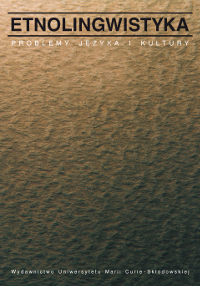Принципы описания и адаптации «чужой» культуры языковыми средствами «своей» традиции
The principles of description of another culture in the language of one’s own
Author(s): Oľga Vladislavovna BelovaSubject(s): Anthropology, Language and Literature Studies, Foreign languages learning, Applied Linguistics, Cognitive linguistics
Published by: Wydawnictwo Naukowe Uniwersytetu Marii Curie-Sklodowskiej
Keywords: adaptation; foreign culture; lexis; phraseology; Slavic folk terminology; Jewish terminology; folk etymology
Summary/Abstract: The author deals with the problem of adapting a foreign culture through linguistic means from one’s own tradition, mainly lexis and phraseology. Specifically, she deals with the folk terminology of Slavs and Jews and observes that Jewish rituals or customs may be referred to by means of Slavic, i.e. “one’s own” lexis. The following issues are discussed: (1) the use of distinct terms to describe foreign reality, e.g. окóпысько (the term used only in reference to Jewish burial places); (2) the use of familiar terms to refer to elements of the foreign culture (e.g. cerkiew ‘orthodox church’ or kaplica ‘chapel’ used in reference to Jewish temples); (3) adaptation of a foreign term to one’s own tradition (maca ‘matzah’, szabas ‘the Sabbath’); (4) the use of folk etymology as a mechanism of a peculiar kind of translation of texts from a foreign culture (e.g. a Jewish festival was called lizówki, which according to folk etymology came from lizać ‘lick’); (5) the use of a lexeme as a shortened form of a whole folk text (e.g. the Ukrainian Ґамана ‘bread used for the Purim holiday’). The data for the analysis come from Polesia (today’s Belarus, Ukraine and Poland), Podolia (today’s Ukraine), Podlachia (today’s eastern Poland and western Belarus), the vicinity of the Carpathians, Bukowina (today’s Ukraine) and western Belarus.
Journal: Etnolingwistyka. Problemy Języka I Kultury
- Issue Year: 20/2008
- Issue No: 20
- Page Range: 201-213
- Page Count: 13
- Language: Russian

